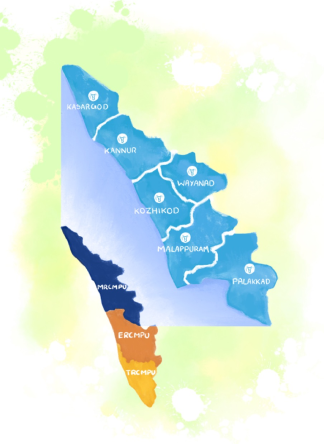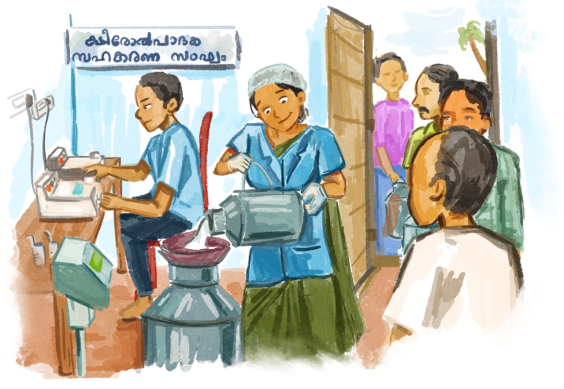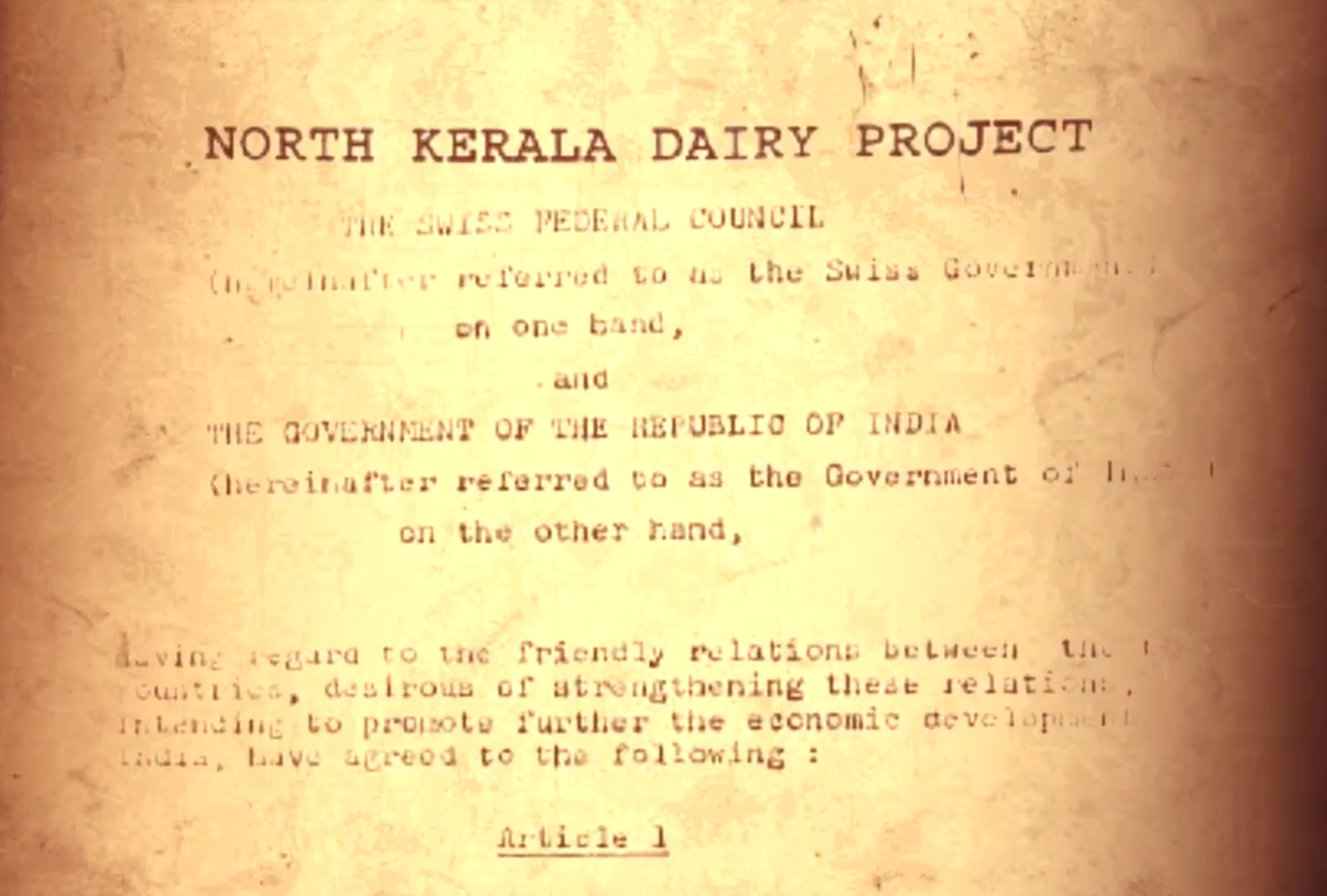

Malabar Milma, the largest dairy cooperative organization in Kerala, continues its successful journey by providing support to dairy farmers in the Malabar region, thereby playing a major role in the sustainable growth of the sector. The collaborative efforts with the Dairy Cooperative Societies, which are key links in the dairy sector, strengthen this field. The Malabar Regional Union also ensures consumer satisfaction by manufacturing and marketing quality milk and milk products based on the needs and interests of the consumers. The Malabar Regional Union is able to provide nearly 3.5 crore rupees daily as milk price to the dairy farmers in Malabar. In addition to the milk price, the Regional Union implements various welfare schemes for the Dairy Cooperative Societies and milk producers. Besides providing 84% of the milk sales price as direct procurement price, additional milk price and cattle feed subsidy are being provided, the Regional Union also implements various dairy farmer welfare schemes through the societies for the farmers. Such activities are a model for the dairy cooperative movements across the country. From an initial stage of having 144 Anand Pattern Cooperative Societies as members, today about 1200 dairy societies are working together with Malabar Regional Union. The initial daily milk procurement of the Regional Union, which was 57,000 litres, has currently increased to 6,60,000 litres per day. Against having only two products along with milk initially, today the Malabar Regional Union has more than 60 products. The annual turnover, which was 13 crore rupees in the initial days, is now around 2000 crore rupees.

For the past 36 years, the Malabar Regional Union has been able to play a constructive role in the social and economic upliftment of the dairy farmers in the Malabar region. The milk produced by the dairy farmers is procured at the rural dairy cooperative societies without compromising on quality, and to maintain the natural freshness of the milk, it is transported to centralized locations at the village level and chilled in Bulk Milk Coolers. Subsequently, it is taken to the dairies, subjected to strict quality checks in laboratories equipped with state-of-the-art facilities, and then converted into packed milk and dairy products through the processing stage. Through a distribution network of about ten thousand outlets, an average of 6.5 lakh litres of milk is delivered accurately to consumers 365 days a year, in addition to which Malabar Milma is active in the market with 60 value-added products in over 300 different Stock Keeping Units. Malabar Milma holds the unique distinctions of being the organization that gives the highest milk price to dairy farmers in the country and the cooperative institution that procures the milk with the best microbiological quality in the country.

The Malabar Regional Union has been performing excellently in turnover, marketing, and product diversification. Milma is committed to ensuring that the milk price for farmers in the dairy sector, which plays a very important role in the agricultural field, is delivered accurately. The profit of the Regional Union is returned to the farmers through incentives and numerous farmer welfare activities. Unlike other institutions, the management of the Regional Union and Milma is entrusted to a committee elected by the farmers themselves and a Governing Body elected from it through voting rights. Hence, they are able to make excellent decisions for the welfare of the farmers.
Milma's development model involves systematically planning the necessary procurement, processing, and marketing investments for the dairy industry with a clear long-term vision, and raising the required funds from its own trade profits, Central and State Governments, and well-wishers like the Swiss Development Agency. The notable growth achieved by Kerala in the dairy sector is the result of the collaborative efforts of the State Government and Milma, which maintains a stable price for milk in the market. Malabar Milma continues its victorious journey embracing the motto: "Farmer’s Prosperity through Consumer Satisfaction."


The Indo-Swiss Project Kerala (ISPK) was an agreement signed between the Central Government of India and the Government of Switzerland in 1963 with the aim of developing high-yielding hybrid cattle suitable for the local environment of Kerala. This project marked the beginning of adopting scientific methods in Kerala's dairy sector. This experimental project, conducted on five hundred acres of vacant government land in Mattupetty, utilizing the potential of dairying-based mixed farming in the high ranges of Peerumedu in Idukki district, became the foundation for a radical change in Kerala's dairy sector. Subsequently, as part of the nationwide expansion of the successful 'Anand Pattern' of Gujarat (where milk production, procurement, processing, and marketing were integrated in the cooperative sector), and as part of the second phase of 'Operation Flood' – the world's largest dairy development program – it was decided to implement it in Kerala in the 1980s. The Ernakulam and Thiruvananthapuram Regional Unions of MILMA were formed as part of this decision. However, the National Dairy Development Board's feasibility study concluded that there was no scope for an increase in milk production in the Malabar region, and thus the region was not considered for the implementation of this project. During the period when dairy development activities were underway in the rest of Kerala as part of Operation Flood, the North Kerala Dairy Project (NKDP), a contract signed between the Government of India and the Government of Switzerland on September 25, 1987, for dairy development activities in the Malabar region, led to the formation of the Malabar Regional Co-operative Milk Producers' Union (Malabar MILMA), the largest dairy cooperative movement in Kerala.

The North Kerala Dairy Project (NKDP) was an agreement signed between the Government of India and the Government of Switzerland on September 25, 1987, on the model of the Operation Flood project, to ensure comprehensive dairy development in the Malabar region. The Malabar Regional Union was formed during the first phase of this project, which was implemented in two phases with a financial assistance of Rs.26.02 crores, covering the six northern districts of Kerala. Out of the total Rs.26.02 crores received, Rs.16.18 crore was a grant and Rs.9.84 crore was a loan. Implemented in three phases (including two initial phases and one later extension), this project laid the foundation for comprehensive dairy development in Malabar.
The Malabar Regional Co-operative Milk Producers' Union (Malabar MILMA) is the largest dairy cooperative movement in Kerala, registered on June 29th, 1989, and operating since January 15, 1990, with its headquarters in Kozhikode, covering the six northern districts of Kasaragod, Kannur, Wayanad, Kozhikode, Malappuram, and Palakkad, as part of the North Kerala Dairy Project. Despite numerous challenges, Malabar MILMA started operations with 144 dairy societies, less than ten thousand dairy farmers, and an average daily milk procurement of 57,000 litres. Today, its growth to a dairy cooperative movement with 1,150 member societies, about one lakh dairy farmers, an average daily milk procurement of 6,70,234 litres, a milk sale of 6,71,098 litres, and an annual turnover of around Rs.2000 crores, is a great achievement inscribed in golden letters in the dairy development sector of Kerala. The Malabar Regional Union, which operated under clear Swiss supervision financially and organizationally until 2002, converted all the initial crises—including the initial resistance to merger from the Malappuram, Wayanad, and Kozhikode District Milk Unions, the opposition of traditional dairy societies to the Anand Pattern, lack of processing facilities, milk scarcity, easy spoilage of milk, the limitation of only ghee as a product, and being excluded from the Operation Flood project—into energy. The Union has grown into a Regional Union that attracts national attention with the highest number of dairy farmers, dairy societies, milk procurement, marketing, products, and revenue in Kerala, all thanks to excellent management expertise, professional approaches, and distinctive operations.

| Date of Registration | 29/06/1989 |
| Date of starting operation | 15/01/1990 |
| No. of Dairy Plants | 6 |
| Central Products Dairy | 1 |
| No. of Raw Milk Reloading Centre | 2 |
| No. of Procurement and Input Centres | 10 |
| No. of Marketing Depots | 7 |
| No. of Human Resource Development Centre | 1 |
| Average daily procurement of raw milk (2024-2025) | 6,51,339 Litres |
| No. of farmers supplying milk to the Union (2024-2025) | 77,750 |
| Per day processing capacity (2024-25) | 9.75 lakhs |
| Per day rural milk chilling capacity (2024-25) | 9.0 Lakhs |